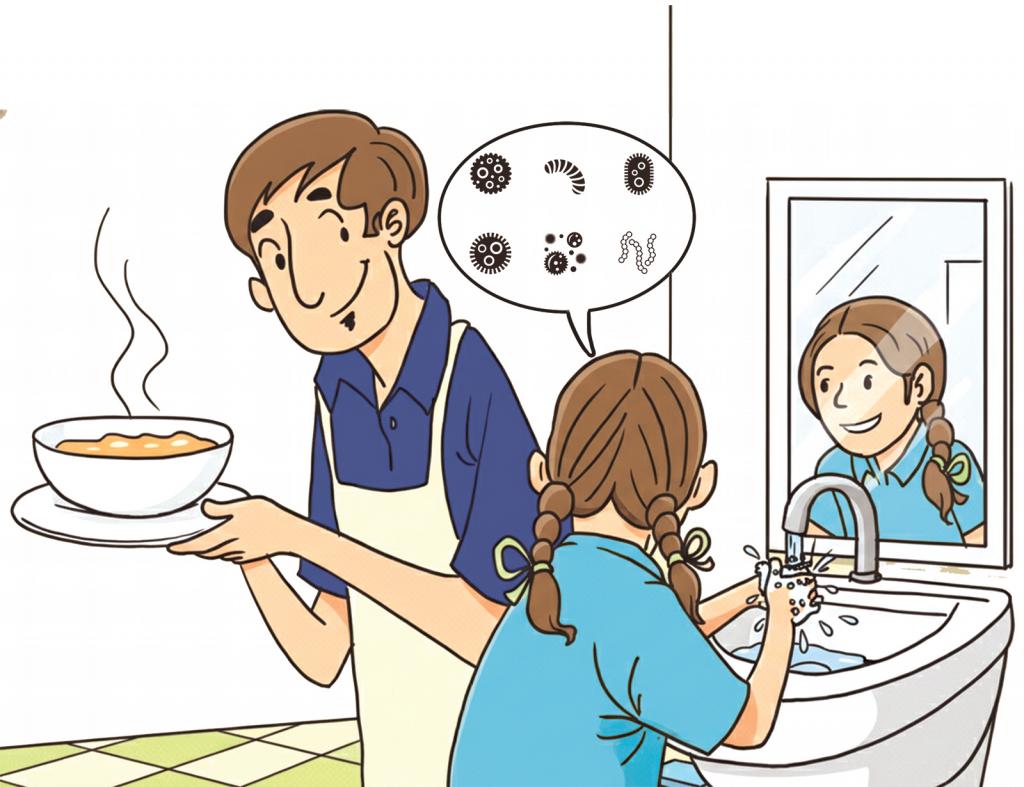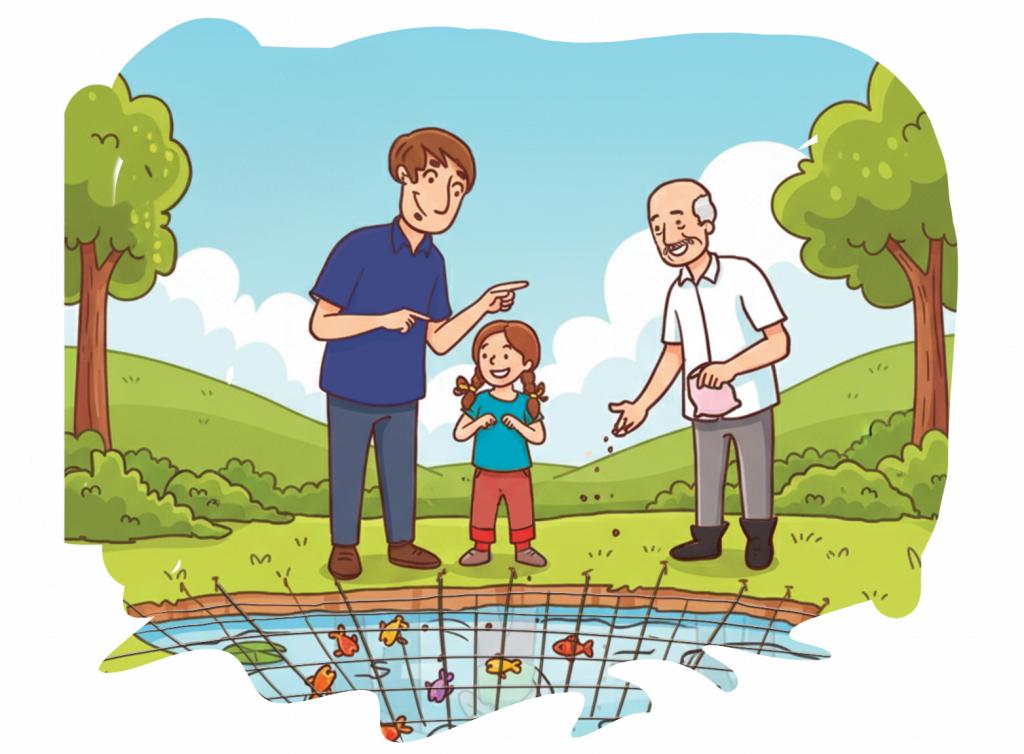
Curious Sucharita discovers how the overuse of antibiotics in fish farming can build superbug resistance — and what judicious use can do to stop it.
On a pleasant November afternoon in the coastal city of Bhubaneswar, Sucharita returned energetically from her school. With sparkling eyes she announced, “We had a special lecture today. It was on Antimicrobial Resistance. Aye—Emm—Aaar they called it. And there's World AMR Awareness Week also. It’s from the 18th to 24th this month. We’re supposed to wear blue for that. Papa, after lunch, please click my pic in this blue tee. I’ll share it on our WhatsApp group—no filters!”
“Why blue?” Debashish, her father, asked amusingly—a fisheries scientist himself.
“Blue stands for… knowhow about antibiotics, their wise use, and protection from superbugs. You don’t know?” She poked him.
Dad enjoyed acting ignorant, “Oh! I don’t even know what antibiotics and AMR are!”
“Lol! Shabitri Ma’am taught us about bacteria today. They are very tiny creatures found just everywhere—in water, in soil, our food, and even inside our bodies! Some are good and help us digest food. But some are badass and make us sick. To fight these baddies, we have antibiotics. The chemicals in these antibiotics stop the bacteria from growing or even kill them. So, whenever we have any bacteria-caused infection, the doctors prescribe antibiotics to us,” she regurgitated.
“Sometimes, when the antibiotics are used continuously, the bacteria get used to battling against them. Eventually, they’re able to crack their fighting secrets and even match them! Then they stop getting beaten by the antibiotics anymore and become resistant to their impact. These strong bacteria continue to grow and multiply into more antibiotic-resistant bacteria.”
Debashish nodded eagerly. Then she paused for a moment and stared at the Rohu tarkari on her plate. “Does this have any antibiotics in it? I heard in the lecture that antibiotics can get into our body through food,” she enquired.
“That’s right,” Debashish explained like all Papas. “Antibiotics can be given to animals like cows and chickens or even fish—if they have infections. But sometimes, farmers use antibiotics even when there is no infection. They mix it with the animal feed to make them grow faster and fatter so that they can sell their meat, eggs, milk, or fish quickly. This incurs them less losses and earns them a quick income.”
Sucharita was buffering the info. “Once the fish eat this antibiotic wala (meaning, ‘mixed’ here in Odia) food, it goes into their stomach and starts acting. These antibiotics take some time to get out of the fishes’ body completely. It’s called their ‘withdrawal period’ and if a fish is sold before this withdrawal period then it can contain traces of antibiotics,” revealed Debashish the Dad, who now appeared like a cool veteran scientist to his daughter.
“Not only this, most antibiotics that fish consume are excreted undigested through their poop into pond water and from there enter drains, rivers, and the bigger environment. Bacteria present in all these environments can get exposed to these antibiotics and become resistant too!”

“Oh babaa re! I’m not having maach (fish) anymore!”
“Chill! Our fish comes from trusted farmers. They don’t use antibiotics unless it is really needed,” Dad assured and rose from the table. Mom arrived just then and Sucharita ran into her: “Maaa! What will happen if I eat antibiotic wala food? Will I become resistant to antibiotics? What will happen then?...”
Surprised at facing her troublemaker’s rapid fire quiz, Mom answered, “Well, if the food is not cooked well then the antibiotics entered inside our body can make our gut bacteria resistant over time. So, if we take these antibiotics later to cure any illness, they will not work on us.” Sucharita’s Mom, Parbati, was an infectious disease specialist.
With his mischief-maker looking concerned, Debashish teasingly pulled her ponies and proposed, “I’m visiting a fish farm tomorrow for office work, just to see what the farmers are doing about their fish and all. Should I go alone or Sucharita-the-Superbug Smasher wants to tag along with me?”
“Yes, I want to!!!” Sucharita jumped jubilantly!
Next day, Debashish, Parbati, and their antibiotic-investigator, Sucharita, went to Pipili, a village about 30 km off Bhubaneswar. Upon arrival, Prasanna Sahoo, an experienced farmer, welcomed them on his premises. He sanitized their hands and insisted they put covers on their shoes.
“Why are we wearing this?” She was suspicious. “And why is there a net over that pond?” Prasanna had four ponds where he reared Pangasius along with Rohu and Catla (commonly known as Indian major carps).
“That’s part of biosecurity,” replied Debashish. “These measures ensure that we do not introduce any bacteria from outside into the farm and spread infection among the fish reared. Those nets are installed for the same reason—to keep away predatory birds and any infection that they could trigger.”
“You missed noticing the white powder sprayed there.” Parbati pointed to the farm’s floor. “It’s bleaching powder, another disinfectant used in these farms.”
As Prasanna sprinkled some feed over the pond’s surface, the fish frenzied and speedily swarmed towards the food. “Look Ma! They’re diving so hungrily!” exclaimed Sucharita.

“Yes, beta,” Parbati chuckled at her excitement and explained, “These are healthy fish and all they need is clear water, nutritious food, and proper care. They don’t need much medicine.”
Prasanna added, “I’ve got a good fish yield this time not only because I’ve kept the water clean but also because I’ve fed them probiotics.” Sucharita immediately carried a question mark on her face.
Debashish simplified, “Probiotics are good bacteria that keep our digestive system happy and balanced so that we stay fit and fine. Probiotics work similarly on fish too! They keep the fish’s tummy clean, help them digest better, and fight germs.” That’s how Sucharita toured the rest of Prasanna’s farm—with awe and wonder, keeping her parents on their toes.
By the time Prasanna showed them his latest fish products, his neighbour, Bishnu, joined them. He was wearing shoe covers too. Bishnu appealed to Debashish, “Shaab… In my ponds, the carps are not eating food properly. They swim slowly to the surface and remain sluggish throughout the day. Some have swollen bellies and red sores on their scales and fins. Can you please give me some advice?”
Debashish pursed his lips for a moment and then suggested, “Your fish may be having some bacterial infection which is making them weak and sick.”
“Ooo something fishy!... Quickly call a doctor, please,” joked Sucharita stupidly. Debashish stared at her, “Unlike dogs and cats, which have veterinarians and clinics to go to when they are unwell, fish do not have any doctors, Sucharita. Only a few antibiotics are allowed for them like tetracycline, oxytetracycline, and trimethoprim. And these too have to be given in veryyy little amounts, strictly as per our government rules.” Sucharita became alert now, “Ma, then can we give to the fish, the antibiotics you prescribe to your patients?”
“Big NO!” Parbati declared. “We should NOT feed the fish the same antibiotics we use for ourselves. In fact, some are even considered critically important by the World Health Organization. Meaning, they should be used only and solely for humans and that too when needed! We should always try to conserve antibiotics for our future because as the bacteria are becoming smarter day-by-day, the antibiotics are becoming increasingly ineffective. Basically, when people fall ill nowadays, they aren’t easily getting cured because the antibiotics given to them aren’t working!”
“And that’s why I always recommend our farmers to go for prevention,” cautioned Debashish. “Bishnuji, it’s far better to go for probiotics and herbal medicines to handle the infection in your fish than to administer them any antibiotic. If we keep the farm clean, the pond water clean, maintain correct water parameters like pH, and give good food to the fish, they will remain healthy. In case they still fall sick, use nature’s pharmacy—herbs and spices—to cure them. These are much safer, effective, and cheaper! Prasannaji follows this to the T and is reaping great results.”
“Exactly! Keep your farms hygienic and serve your animals nutritious food. Then you won’t need any antibiotics at all. Your fish will be safe and so will be the environment. It’s really that simple and easy—prevention is always better than cure,” summarized Parbati.
“Shabitri Ma’am also kept repeating the same,” Sucharita’s bulb lit suddenly, “She strongly asked us to wash our hands before and after meals, as preventing diseases is far better than curing them with medicines.”
“Or curing them with antibiotics?” leg-pulled her father.
“Yusss! Lesson learnt: avoid antibiotics fully or use them really sparingly. ‘Coz if you keep taking them needlessly, they’d be unable to cure you when you really need them! In fact, even be cautious of any food item that might contain antibiotics.” Sucharita admitted to everyone’s relief.